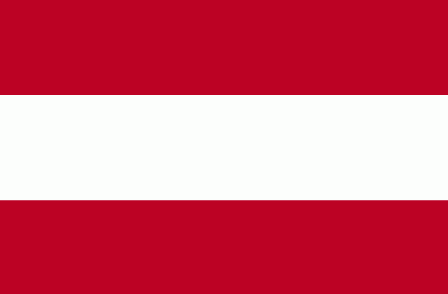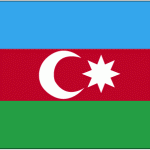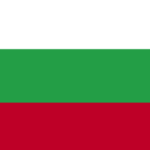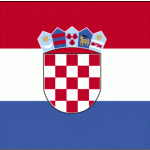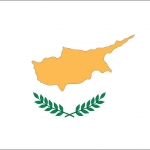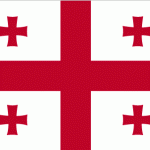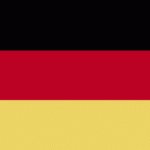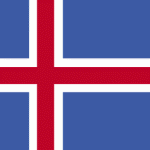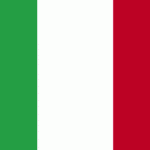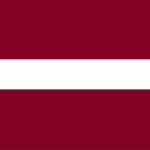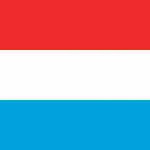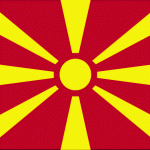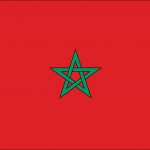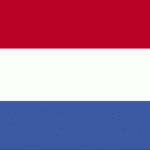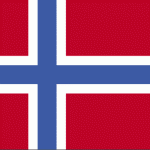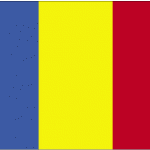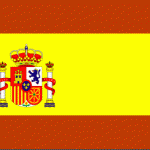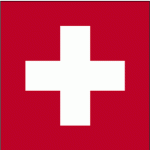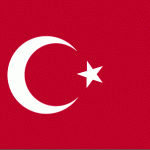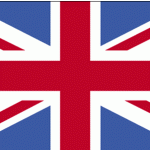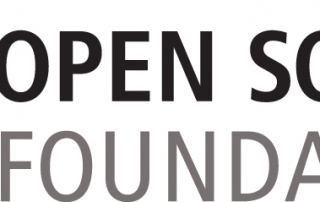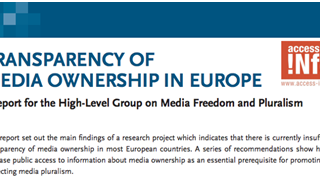¿QUIÉN CONTROLA REALMENTE LOS MEDIOS?
SÓLO EN 9 DE 20 PAÍSES EL PÚBLICO PUEDE SABER QUIÉNES SON
LOS DUEÑOS REALES DE LOS MEDIOS DE COMUNICACIÓN
¡TIENES DERECHO A SABERLO!
¿Por qué queremos esta información?
¿Tienes alguna duda sobre por qué necesitamos saber quién controla los medios? Puedes leer aquí las preguntas y respuestas más frecuentes [en inglés]
Las Diez Recomendaciones sobre la Transparencia de los Dueños de los Medios de Comunicación
1. Obligación de publicar la información básica y esencial
2. La información debe ser fácil de encontrar y gratuita
3. La información debe ser actualizada con frecuencia
4. La información debe ser publicada en formatos abiertos y debe ser reutilizable
5. Propuesta de un progresivo aumento de los niveles de transparencia
6. Transparencia de las influencias sobre los
medios
7. Propuesta de un marco legal claro y preciso
8. Organismo independiente encargado de
controlar
9. Información pública y accesible para
la sociedad
10. Acceso a la información y comparabilidad a nivel transnacional
Descarga aquí las Diez Recomendaciones sobre la Transparencia de los Medios de Comunicación al completo (.pdf), y encuentra a continuación nuestro análisis por país
¿Quién más piensa que la transparencia de los medios importa?
Más información – consulta las preguntas más frecuentes, recorre nuestra investigación al competo o revisa las últimas actualizaciones. También puedes ver las entrevistas a académicos, periodistas, activistas y expertos en medios. Puedes ver todas las entrevistas aquí.
La transparencia de los medios es importante para aquellos que los consumen. Cuando leo un periódico o veo la televisión, me gusta saber quién es la persona que me está transmitiendo esa información.
Los medios pueden afectar e influir la forma en las que piensan las personas, así como las decisiones que toman. Por eso saber quién está detrás de un medio o de un grupo mediático es clave para una sociedad transparente.
Todos los medios llevan consigo algún tipo de opinión, alguna ideología; y puesto que los medios tienen un papel tan importante en la creación de ideologías y a la hora de configurar cómo piensa la gente, es importante saber quiénes son las personas que te están diciendo qué pensar.
No se me ocurre ni una sola razón por la que el público o la sociedad en general no deba saber quién controla cualquier grupo mediático.
La sociedad civil tiene el derecho de saber quién les está hablando.
El panorama mediático ha cambiado globalmente, en todas partes, y ahora estamos en una situación en la que hay tantas formas sofisticadas de ejercer presión.
Investigación y análisis de cada país
Contáctanos si estás interesado en investigar la transparencia de los medios en tu país.
¿Quién ha apoyado esta campaña y las Diez Recomendaciones?
Han dado su apoyo:
ONGs Internacionales
Access Info Europe
African Initiative for Communication and Freedom of Expression
CMFE
Corporate Europe Observatory
Freedom Forum
Open Society Program on Independent Journalism
Publish What You Pay
Sunlight Foundation
The MediaWise Trust
Universal Rights Network
Xchange Perspectives e.V.
Individuos
Ana Revuelta Alonso, Investigadora
Carlos Pallarol, Periodista
Reynaldo Castro Melgarejo, Investigador
Organizaciones de la sociedad civil nacionales, regionales y otros
ACEP
ALBANIAN MEDIA INSTITUTE
Amis de la Terre Isère
Association Funky Citizens
Association of Journalists of Macedonia
Bangladesh NGOs Network for Radio & Communication (BNNRC)
Berne Declaration / Erklärung von Bern
Campaign for Press and Broadcasting Freedom
CDDI
Civil Control for Animal Defense
Civio Foundation
D.A.T.A.
European Federation of Journalists
Forum Informationsfreiheit
Fundación Civiliter
Fundación Economistas sin Fronteras
GONG
Independent Association of Georgian Journalists
Independent Media Trade Union of Ukraine
Informace pro vsechny
Institute for Development of Freedom of Information (IDFI)
Investigative Journalism Center, Zagreb-Croatiater
K-Monitor (Hungary)
Media Reform Coalition
Mertek Media Monitor
National Council for Radio and Television (Grecia)
Nexus Research
ONG Moral
Opcions
Palestinian center for development and media freedoms-mada
Peace Institute Ljubljana
Press Council of Kosovo
Press Institute of Mongolia
Public Association Center for Promotion of Freedom of Expression and Access to Information
Qué hacen los diputados
République Citoyenne
Right to Information Assesment and Advocacy Group
Solidaridad Postal
Transparency International Ukraine
Medios
Eldiario.es
Empresas privadas
Openwise PC
ÚLTIMAS NOTICIAS SOBRE TRANSPARENCIA DE LOS MEDIOS
Croatia TMO Consultation
Can the public find out who owns the media through free access to the essential information required? In Croatia, it is possible to finds out who owns print, broadcast and online media in Croatia through information reported to: the relevant media authorities; directly to the public; or to corporate /trade registers. Through the various amendments to the Media Law (2011)
Bulgaria TMO Consultation
Can the public find out who owns the media through free access to the essential information required? Owners of print, electronic and online media which are registered companies can be identified in Bulgaria but only through cross-referencing the disclosures under the relevant media law with those under the Company Registry Act. None of the laws are, on their own, sufficient
Azerbaijan TMO Consultation
Can the public find out who owns the media through free access to the essential information required? It is not possible to find out who owns the media Azerbaijan through media-specific or company law. Since June 2012, amendments to the Law on the Registration of Legal Entities, on Commercial Secrecy and the Law on Obtaining of Information mean that information
Austria TMO Consultation
Can the public find out who owns the media through free access to the essential information required? According to the Media Act, as amended in 2011, it is possible to finds out who owns print, online and broadcast media through information reported directly to the public. All media must disclose enough information for their real owners to be identified, including
About the Transparency of the Media Ownership Project
Madrid, 1 August 2013 - Research by Access Info Europe and the Open Society Media Program in 20 countries (19 European region plus Morocco) has revealed that the legal framework in most countries is insufficient to guarantee transparency of media ownership. » In only 9 of the 20 countries (including only four of the EU member states surveyed), can the
Public Consultation on Transparency of Media Ownership in Europe
Madrid, 1 September 2013 – Access Info and the Open Society Media Program would like your input on our draft recommendations for improving the transparency of media ownership in Europe – please fill in this questionnaire – it has 10 questions and takes 8 minutes: https://www.surveymonkey.com/s/TransparencyMediaOwnership Recommendations: Access Info and the OSMP has developed a set of recommendations which are

